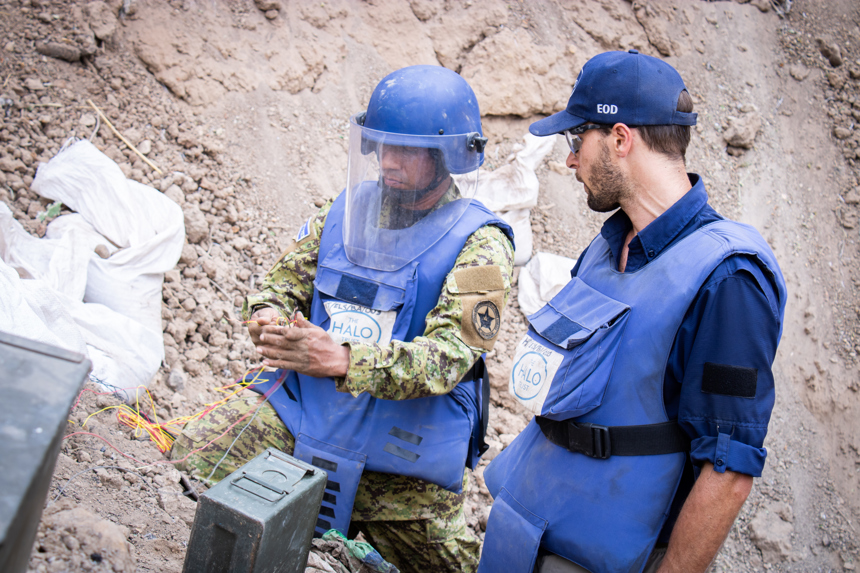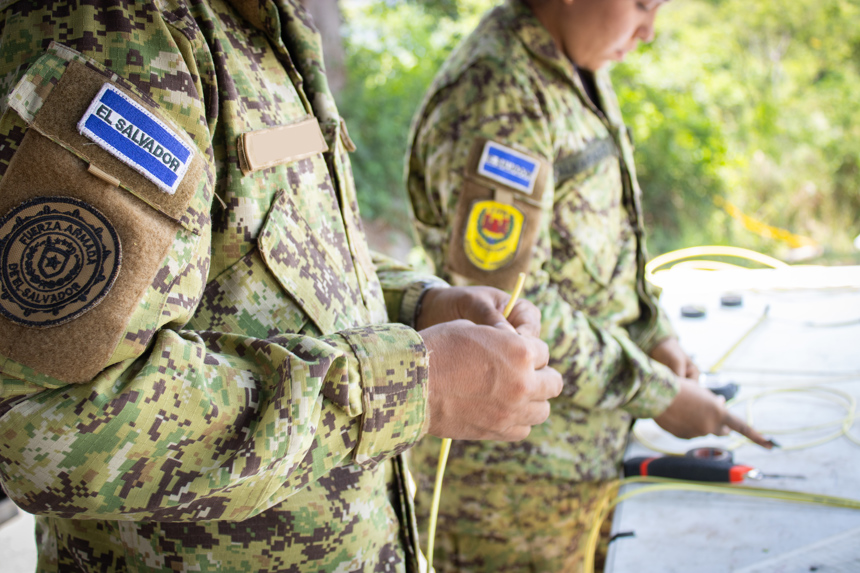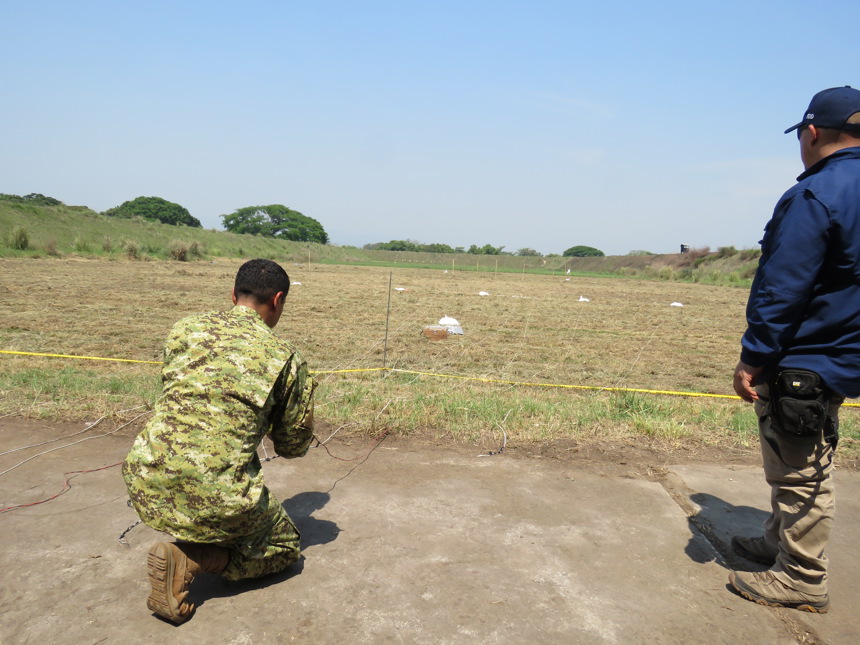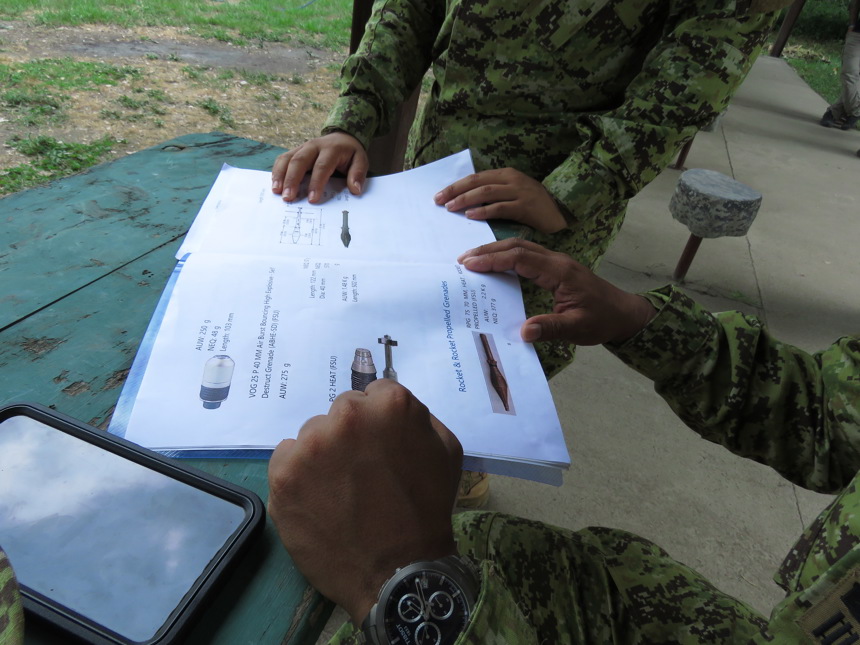"We never know where inspiration is going to come from and how far we are going to go with it".
For Captain Mario Flores, joining the Armed Forces of El Salvador marked a complete 180-degree shift in his life. Now 37 years old, he has spent 17 years in the military, a testament to his commitment, patriotism, and loyalty. But it all began during his teenage years, when a friend encouraged him to enlist. He never imagined how far that decision would take him.
Today, Captain Flores is a leader in the Armed Forces and a certified expert in explosive ordnance disposal (EOD). Most recently, he participated in the EOD Level 3 course conducted by instructors from The HALO Trust. Together with his fellow classmates, he earned certification under the International Mine Action Standard (IMAS), solidifying his advanced knowledge in safely identifying and destroying explosive hazards.

Captain Flores during a practical training session in the EOD Level 3 course, alongside a HALO technician.
The course took place at the Armed Forces Engineer Command in San Juan Opico, La Libertad, El Salvador, with financial support from the U.S. Department of State’s Office of Weapons Removal and Abatement (PM/WRA). Captain Flores, proud and newly certified, shared how the training helped him deepen his expertise in managing and safely disposing of outdated or unstable ammunition and explosive targets.
In the military, knowledge is often passed down from one generation to the next. After completing both EOD Levels 1 and 2, Captain Flores has been able to share this vital information with colleagues across different units, not just his own. With his recent Level 3 certification, one of the highest qualifications in EOD, he now looks forward to teaching and practicing alongside others in the coming months.

Day one of EOD Level 3 practical training.
Around the world, poorly managed stockpiles of weapons and ammunition pose a serious risk—causing accidental explosions, loss of life, destruction of infrastructure, and setbacks to economic development. As Captain Flores learned during the course, safe and effective weapons and ammunition management can prevent these tragedies. Through programs like this, HALO is helping reduce human suffering and laying the foundation for long-term peace.
“These courses are very useful, because they allow us to expand our knowledge and improve our procedures. If I had to say whether they’ve been beneficial—definitely!”
What began as a teenage decision, sparked by a friend’s suggestion, has grown into a career of service, leadership, and life-saving expertise. Thanks to his determination—and the support of HALO—Captain Flores continues to give back to the people of El Salvador by making the country safer, one training session at a time.

Demonstration of explosive effects during the EOD Level 3 course.
El Salvador once had one of the highest rates of violence in the world. In 2017, the World Health Organization ranked it among the most dangerous countries globally. That same year, the U.S. State Department’s PM/WRA began supporting HALO’s Weapons and Ammunition Management (WAM) program in the region. The program provides expert guidance to conflict-affected states, helping prevent the risk of unplanned explosions and diversion of state-held weapons. It also strengthens national institutions through improved accountability and adherence to international standards.
Since 2017, HALO has trained 699 individuals in Physical Security and Stockpile Management (PSSM) and EOD across the region—including 67 women. The organization has also destroyed 6,787 small arms and light weapons, over 230,592 rounds of ammunition, and 34.3 U.S. tons of munitions. In addition, HALO has carried out 80 risk assessments and rehabilitated 22 armories and storage sites.

EOD Level 3 students prepare for their final course evaluation by checking their materials.
The HALO Trust is grateful to the U.S. Government and the Department of State’s Office of Weapons Removal and Abatement for their generous support. The views expressed in this story are those of the authors and do not necessarily reflect those of the U.S. Department of State or PM/WRA.
Note: The name in this story has been changed for security reasons.
HALO's work in Central America is generously supported by the US Government.



